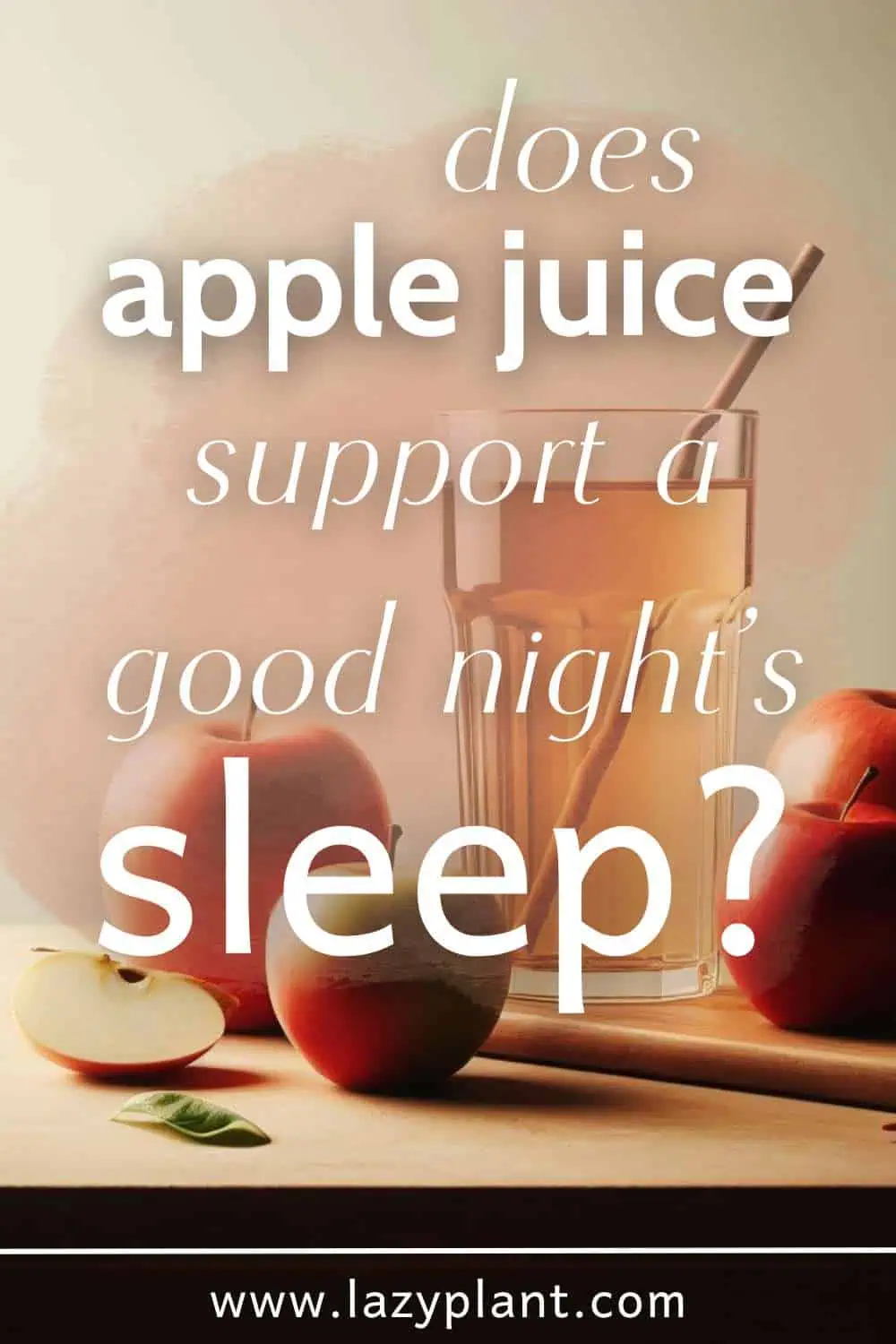Although melatonin, vitamin C, and potassium in apple juice support a good night’s sleep, it’s best to avoid consuming it close to bedtime, as its high sugar content can have detrimental effects on sleep onset latency and quality.
Sugar in apple juice can deteriorate Sleep
Apple juice is particularly high in sugar. Commercial apple juices may contain added sugar.[1]
People who follow the standard Western diet consume more than 300% of the maximum recommended daily intake of sugar! High intake of sugar is a common cause of obesity.[2]
Moreover, the consumption of high amounts of added sugar, especially close to bedtime, can have detrimental effects on sleep onset latency, duration, and overall quality. Shortened sleep duration has been linked to increased appetite and risk of obesity. Also, it may lead to fatigue and poor physical performance.[3,4,5]
Sugar can lead to a spike in blood sugar levels, followed by a subsequent drop. This fluctuation can disrupt the body’s natural sleep-wake cycle, leading to difficulty falling asleep or staying asleep throughout the night.

Also, sugary foods and beverages can stimulate brain activity, making it harder to unwind and fall asleep. This heightened brain activity can result in increased wakefulness during the night, leading to fragmented or restless sleep.
Research suggests that consuming sugar before bed can interfere with rapid eye movement (REM) sleep, which is crucial for cognitive function, memory consolidation, and overall sleep quality. Disrupted REM sleep can leave individuals feeling groggy or unrested upon waking.
Consistent consumption of sugary foods before bedtime has been linked to an increased risk of developing sleep disorders such as insomnia and sleep apnea. These conditions can further exacerbate sleep disturbances and impact overall health and well-being.
Sugar intake before bed may alter the architecture of sleep, affecting the duration and distribution of different sleep stages. This disruption can result in shallower sleep, decreased sleep efficiency, and a reduced ability to enter restorative sleep stages.
Minimizing sugar intake, especially close to bedtime, can promote better sleep quality and overall health. Opting for healthier bedtime snacks that are low in sugar and rich in nutrients, such as whole fruits.
Apple Juice at Dinner can make you Fat, affecting Sleep Quality
Additionally, we shouldn’t drink apple juice or any other fruit juice at night because they can potentially contribute to weight gain.
Apple juice doesn’t reduce hunger, as it’s poor in fiber. Fiber reduces hunger, regulating energy intake. Consuming at least 5 servings of whole fruits and vegetables a day is the best way to boost the daily fiber intake. Only whole apples are high in fiber. Actually, whole apples are among the best foods you can eat while dieting![6]
Moreover, natural sugars in apple juice contribute to its calorie content. Consuming a glass of apple juice before bed adds calories to your daily intake, and if these calories exceed your body’s energy needs, they can contribute to weight gain over time.
The high sugar content in apple juice can cause a rapid increase in blood sugar levels. When consumed before bed, this spike in blood sugar may lead to increased fat storage, especially if the excess energy from the juice is not utilized.
Obesity can have significant detrimental effects on sleep quality, leading to various sleep-related disorders and disturbances:
Obstructive Sleep Apnea (OSA): Obesity is a primary risk factor for OSA, a sleep disorder characterized by repeated episodes of upper airway obstruction during sleep. Excess fat around the neck and throat can obstruct the airway, causing pauses in breathing and disrupting sleep. OSA is associated with symptoms such as loud snoring, daytime fatigue, and frequent awakenings during the night.
Insomnia: Obesity is linked to an increased risk of developing insomnia, a sleep disorder characterized by difficulty falling asleep, staying asleep, or experiencing non-restorative sleep. Factors such as hormonal imbalances, chronic pain, and psychological distress associated with obesity can contribute to the development of insomnia.

Daytime Sleepiness: Excess weight can lead to daytime sleepiness and fatigue, even after seemingly adequate sleep duration. Disrupted sleep patterns, frequent awakenings, and untreated sleep disorders such as OSA can contribute to daytime sleepiness, impairing cognitive function, productivity, and overall quality of life.
Restless Leg Syndrome (RLS): Obesity has been associated with an increased prevalence of RLS, a neurological disorder characterized by uncomfortable sensations in the legs and an uncontrollable urge to move them, particularly at night. The symptoms of RLS can disrupt sleep initiation and maintenance, leading to poor sleep quality and daytime fatigue.
Decreased Sleep Efficiency: Obesity is often linked to decreased sleep efficiency, which refers to the percentage of time spent asleep compared to the total time spent in bed. Sleep fragmentation, frequent awakenings, and difficulty maintaining continuous sleep can reduce sleep efficiency and contribute to overall sleep disturbances.
Increased Risk of Circadian Rhythm Disorders: Obesity may disrupt the body’s internal clock, leading to circadian rhythm disorders such as delayed sleep phase disorder or irregular sleep-wake rhythm disorder. These disorders can result in difficulties falling asleep and waking up at desired times, leading to erratic sleep patterns and poor sleep quality.
Vitamin C before bed improves Sleep Quality
Furthermore, apple juice is an excellent dietary source of vitamin C. A glass of apple juice has about 30 mg of vitamin C or 33% of the Daily Value.
Vitamin C is beneficial for a good night’s sleep. High intake of vitamin C can increase sleep duration, reduce sleep disturbances, relieve movement disorders, and decrease the dangerous effects of sleep apnea. Also, vitamin C may improve stress tolerance.[7,8]
But, there is no need to drink fruit juices high in sugars, such as apple, orange, or grapefruit juice, right before bed. Actually, the best time to get vitamin C is in the morning. It helps you deal with oxidative stress due to sunlight and air pollution.
The role of Potassium
Additionally, apple juice could help sleep better at night because it’s high in potassium. A glass of apple juice contains about 300 mg of potassium or 21% DV.
Consuming lots of foods high in potassium aids weight loss, indirectly improving sleep quality and duration! High potassium intake has been linked to a lower Body Mass Index (BMI), smaller waist circumference, and lower risk of obesity.
Moreover, low potassium levels seem to affect sleep quality. Especially, men with high blood pressure could benefit from following a potassium-rich diet.[9]
But, you shouldn’t drink apple juice right before bed. You should drink it at dinner, at least a couple of hours before bedtime.
In addition, apples contain some iron which is also associated with sleep disorders.[10]
Melatonin in apples may help sleep better at night
Furthermore, apple juice may help you sleep better at night, as it’s one of the richest foods in melatonin. Melatonin is the internal clock of the body! It’s known as the sleep hormone.
Apples contain up to 6.7 mcg of melatonin per 100g. Apple peel is the richest part in melatonin, though. Hence, better prefer whole organic apples, instead of apple juice.
Moreover, you could drink a glass of red wine or cranberry juice at dinner. Certain wine varieties as well as cranberry juice are particularly high in melatonin. They could help you sleep better at night as well.
Melatonin supports better Sleep
Melatonin is a hormone produced naturally by the body’s pineal gland, and it plays a crucial role in regulating the sleep-wake cycle. It helps regulate the body’s internal clock, promoting the onset of sleep at night and wakefulness during the day.
Melatonin has been used as a natural remedy for insomnia, particularly in cases where sleep disturbances are related to poor sleep hygiene, stress, or other non-medical factors. It can help promote relaxation and prepare the body for sleep, making it easier to fall asleep and stay asleep throughout the night.
In addition to its role in regulating sleep, melatonin also exhibits antioxidant properties, which may have protective effects on the brain and body. Some research suggests that melatonin’s antioxidant properties could help protect against oxidative stress and inflammation, potentially benefiting overall health and well-being.
Should I take Melatonin supplements?
Melatonin supplementation has been shown to improve sleep quality by increasing total sleep time, reducing the time it takes to fall asleep (sleep latency), and enhancing sleep efficiency. It can lead to a deeper and more restorative sleep, leaving individuals feeling more refreshed upon waking.
Moreover, melatonin supplements can help alleviate symptoms of jet lag by adjusting the body’s internal clock to new time zones. Taking melatonin at the appropriate time can help expedite the adjustment process, allowing travelers to adapt to local sleep schedules more quickly.
Individuals who work irregular or night shifts may experience disruptions in their sleep-wake cycle, leading to fatigue and sleep disturbances. Melatonin supplementation has been shown to help improve sleep quality and reduce the adverse effects of shift work sleep disorder in some individuals.
Overall, melatonin supplementation can be a safe and effective option for improving sleep quality and addressing various sleep-related issues.
Most people can safely consume pretty high doses of melatonin from supplements. Melatonin toxicity is rather unlikely. According to studies, moderate melatonin doses between 1 mg and 6 mg appear to be effective in improving sleep in older adults.[11]
However, it’s essential to consult with a healthcare professional before starting melatonin supplements, especially if you have underlying health conditions or are taking medications that may interact with melatonin.
Taking melatonin supplements can be particularly beneficial for individuals with irregular sleep patterns or those who experience difficulty falling asleep at night.
What’s the best time to drink apple juice?
The best time to drink apple juice is in the morning. The body uses sugar for energy. Also, the vitamin C of apple juice can protect the skin, hair, eyes, and nails from dangerous sunlight radiation, help the body burn more fat, and boost the immune system.

Furthermore, a great time to drink apple juice is before or after exercise! The body will burn the sugar of apple juice for energy during exercise. Moreover, it can use sugar to replenish glycogen stores after a workout, accelerating muscle recovery.
How much apple juice can I drink at night?
While apple juice contains natural sugars and may offer some benefits for sleep due to its melatonin content, moderation is key, especially before bedtime.
It’s advisable to limit your intake to a small serving, such as half a cup to one cup, and consume it at least an hour before bedtime to allow your body time to digest.
It’s also essential to choose natural, unsweetened apple juice options whenever possible to avoid unnecessary added sugars. [BUY HERE]
What’s the best beverage to drink at night?
The best beverage before bed is chamomile tea. It’s packed with antioxidants and helps deal with high cortisol levels, stress and anxiety. Also, chamomile tea may help people with insomnia sleep better at night.
Moreover, you could add lemon juice to your chamomile to help the body burn belly fat. Lemon juice is particularly high in vitamin C and other antioxidants. Most noteworthy, it’s pretty low in calories, as it has almost no sugar.
Adding a teaspoon of honey could skyrocket the total antioxidant capacity of your tea, as it has dozens of phenolic compounds. More than 200 have been identified! It’s been used as the key ingredient of traditional home remedies for thousands of years. Honey is the only sweetener on the famous Mediterranean diet.